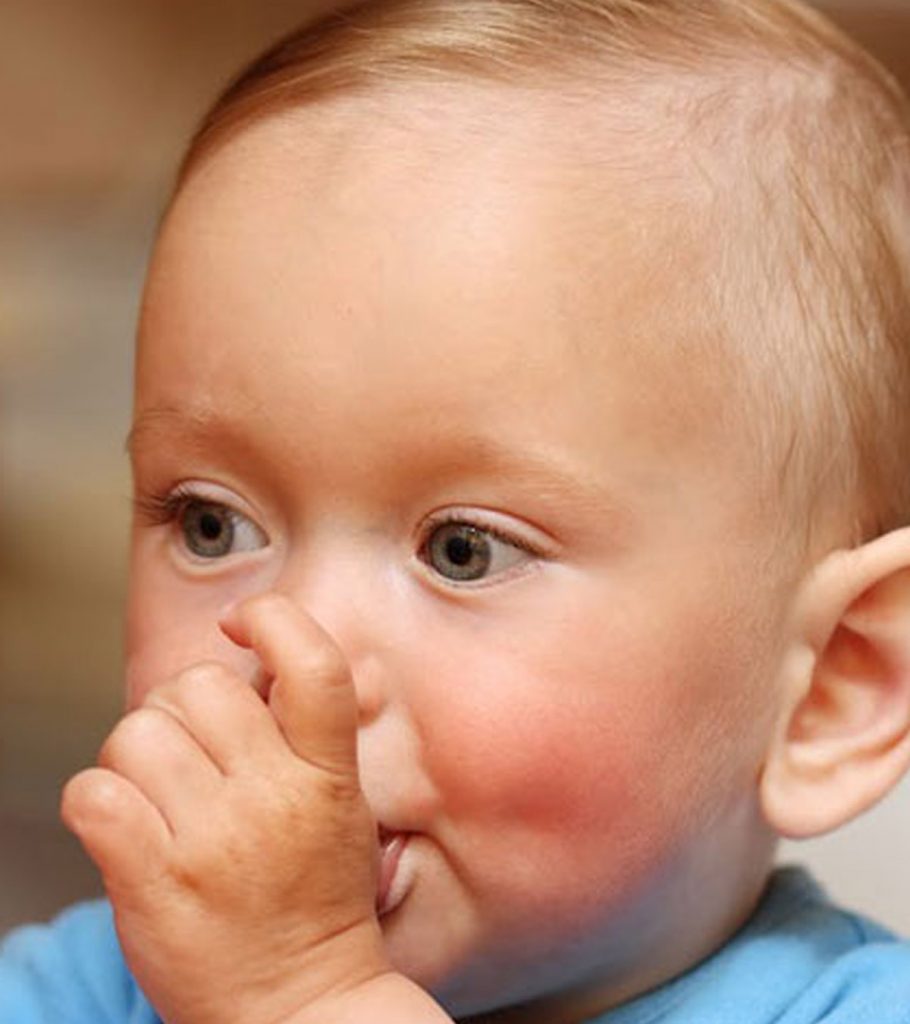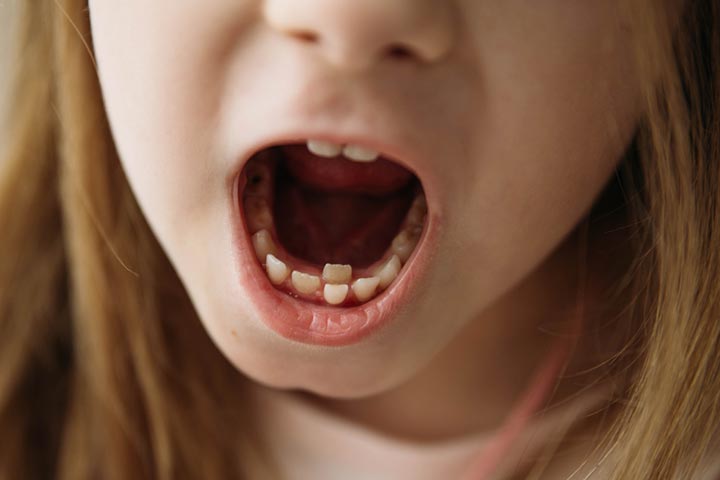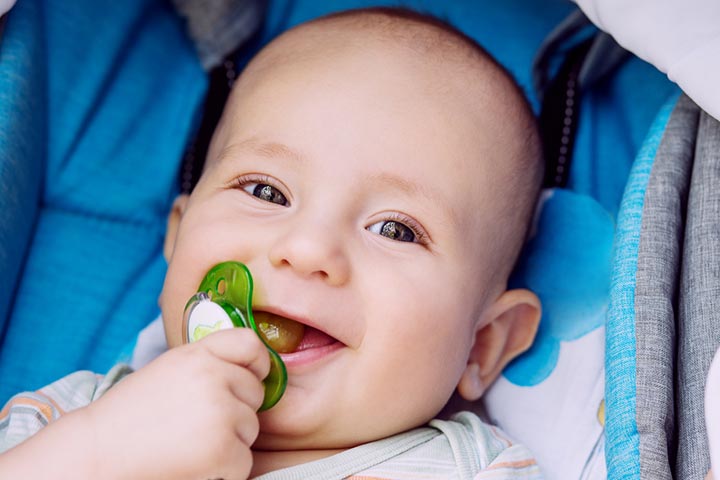It can sometimes be troubling to see your baby sucking their thumb. Although it is a pretty common habit among babies, it might lead to infections and other health issues. In addition, if the habit of thumb sucking is not stopped by the appropriate time, it might continue until they are older and have negative effects.
Read on to know why babies suck their thumb and learn a few ways in which you can stop them from doing it.
Why Do Babies Suck Their Thumb?
Infants have a natural reflex to suck since it helps suckle from a breast easily. The sucking action has a biological role as it enables the baby to gain nourishment, physical comfort, and security. Thumb-sucking helps a baby self-soothe during stressful situations (1). Babies suck their thumbs when they are tired, hungry, bored, sick, or upset. Thumb sucking is, thus, a stress buster for an infant, and they realize it quite early.
When Do Babies Start Sucking Their Thumb?
Believe it or not, babies begin sucking their thumbs in the womb right from the 29th week of gestation (2). Post birth, babies begin sucking their thumb anytime in the first three months. According to Stanford Medicine Children’s Health, it is common for 90% of infants to exhibit hand sucking within just two hours of birth. Thumb sucking does help the baby. But are there any adverse effects?
Is Thumb Sucking Bad For Babies?
Thumb sucking is mostly harmless, but may affect the baby depending on two factors:
- Intensity: The best way to determine the intensity of thumbsucking is by gently pulling the baby’s hand out of the mouth. If the hand comes out smoothly, then he is a passive thumb sucker. If it takes some effort to pull the hand out and if you hear a popping sound from the mouth, then the baby is an active thumb sucker. Active thumb suckers suck the thumbs aggressively and are prone to negative effects.
- Long-term continuity: The older the baby gets with the habit, the higher the chances of the adverse effects. Most babies reduce the intensity of sucking by the age of two. However, If sucking extends beyond the oral phase of infant development, it becomes an oral fixation (3). If they continue sucking their thumb after four years, then they would have problems with their permanent teeth.
Thumb sucking primarily affects dental health, but can indirectly cause other problems too.
Effects Of Thumb Sucking In Babies
The baby can be prone to the following conditions if he sucks his thumbs regularly:
- Callus formation: The thumb’s skin constantly rubs against the tongue and layers of dead skin called callus form over the thumb (3). This could be painful as the thumb loses the skin, the protective layer, and is susceptible to bruises.
- Paronychia: It is a condition where bacteria infect the root of the nails (5). Constant suction pressure on the nail may cause minor nail trauma, leaving a tiny gap between the nail and the skin. Older infants may even nibble and chew at the thumb while sucking, leaving the nails wounded. Such tiny wounds can accumulate bacteria and lead to an infection.
- Herpetic whitlow: It is the infection of nails and fingers caused by the herpes virus. Infants who suffer from oral herpes may involuntarily transfer the virus from mouth to the hand while sucking the thumb (6). Once on hand, the virus attacks the skin and nail roots thus leading to painful blisters on the fingers.
- Orthopaedic problems: Prolonged sucking may cause finger deformities, excess bone growth, and joint dislocation or misalignment (7).
These problems are not exclusively caused by thumbsucking, and there could be other crucial reasons as well. However, long-term thumbsucking certainly affects the baby’s dental health.
Long-Term Effects Of Thumb Sucking
These effects show up when the infant continues sucking the thumb even after the age of five, and all complications pertain to dental health:
- Dental misalignment: The permanent front teeth erupt at an oblique angle during teething due to constant pressure that the thumb puts on the teeth. The teeth of both jaws misalign, which causes problems when closing the mouth.
- Problems with overbite and overjet: Overbite is the extent by which the upper jaw central incisors (maxillary central incisors) vertically overlap the lower jaw central incisors (mandibular central incisors) (8). Overjet is the horizontal distance between two sets of central incisors when they overlap. An aggressive thumb sucker, who continues with the habit even after five years, has abnormal overbite and overjet. It leads to problems in dental spacing where other sets of teeth are affected by the misaligned central incisors.
- Crossbite: The excess overbite and overjet lead to misplaced teeth, which, in turn, results in impaired biting that is called crossbite.
Along with dental issues, the five-year-old can suffer from skin and nail problems too. However, dental problems are more profound. Nevertheless, the American Dental Association (ADA) states that thumbsucking is a natural reflex for infants and is only a concern when the permanent teeth begin to emerge (1). The first permanent teeth emerge after five years (9). As parents, you could curb this habit during infanthood to prevent it from becoming a habit. Parents may worry that their child’s continued thumb-sucking may indicate a deeper emotional or developmental issue related to attachment or dependency. In such cases, seeking the advice of a pediatrician or child psychologist may be necessary to address these concerns.
How To Stop And Prevent The Baby From Sucking Thumb?
Parents must take a systematic approach to keep their babies from sucking thumb. Here are a few ways you can do that:
- Identify the triggers: The baby could be sucking the thumb as a response to a stimulus. For instance, when the baby is bored or hungry, he may suck the thumb. Identify the circumstances that make the baby resort to the action, and address them at once. If boredom is the culprit, then engage the baby in an activity or game that involves the use of hands. If it is hunger, then you must maintain a proper schedule for nursing and feeding to prevent bouts of hunger. If he puts the thumb in the mouth out of exhaustion, then put the baby in a crib for a nap.
- Incorporate gentle reminders: Older infants understand basic instructions and know when you say “No”. In such cases, use soft and gentle reminders to prompt them not to suck their thumb. If the infant stops sucking the thumb, then appreciate him for being obedient.
- Use distractions: You could distract the baby as soon as you sense that he will put his thumb in his mouth. Cuddling the baby, and showing him things outside the window, may distract him and prevent thumb-sucking. Distractions can be intriguing and even soothing for the baby, making them less dependent on thumbsucking.
- Try a pacifier: Consider using a pacifier to break the thumbsucking habit. Pacifiers may function as a thumb, but experts such as the ADA consider them less habit-forming and worth the try (10). The American Academy of Pediatrics (AAP) also has a positive opinion about pacifiers and recommends them to the baby (11). However, do not force the pacifier on the baby, and if he repeatedly rejects it, then skip the idea (12).
Kristin Cummings, a mother and Speech Language Pathologist, supports the use of pacifiers to address this habit. She says, “Probably one of the biggest reasons why I am pro-paci is that it eliminates thumb-sucking. This is coming from a person that sucked her thumb till second grade and had constant sores on her thumb, spacers, braces, and retainers for years. I couldn’t break the habit and don’t want that for my kids. When the time comes to give it up, you can take the pacifier away… you can’t take away their thumb. The key is limiting and monitoring when it is used. Use it in moderation and only use it when your child needs it. In our house, we only use it for naps and at night. It hardly ever leaves the bed (i).”
Make an effort to stop thumb sucking, but do not indulge forceful actions. Do not punish the baby for sucking at the thumb (13). Also, do not use a harsh tone when reminding the baby not to suck the thumb. Do not put a bandage or a bitter medicine on the thumb. The baby may become stubborn and grow more inclined towards thumb sucking. If nothing works, it is best to wait it out as the little one is invariably going to quit the habit by himself.
When Do Babies Stop Sucking Their Thumbs ?
Babies stop sucking their thumbs between two and four years. According to the University of Chicago, only 30% infants continue sucking their thumbs after the age of one. It means that most babies give up the habit before their first birthday. Only 12% infants continue sucking their thumbs even after the age of four. If the little one continues sucking the thumb even after four years, then consult a pediatrician. Counseling and corrective practices help the toddler give up the habit as he is old enough to understand the instructions.
Baby sucking thumb is a common reflex and seldom an alarming concern. If your baby does not quit this habit by age four, they are likely to give up on it before turning 14. Although the habit is commonly seen from infancy to toddlerhood, if you notice your baby sucking their thumb beyond age four, you may need to step in and help them get overcome the habit. You could also try using a pacifier or gently removing their thumb from their mouth by distracting them to prevent bruises on the thumb or misaligned teeth. Staying mindful of the triggers that can cause them to suck on their thumbs may help your baby avoid thumb sucking.
Key Pointers
- Babies relieve stress by sucking their thumbs when tired, hungry, bored, sick, or upset.
- Excessive thumb sucking can affect the baby’s dental health and finger development and may cause skin and nail infections.
- Dental problems such as misalignment, overbite, overjet, and crossbite may arise if a child continues thumb-sucking after age five.
- To divert the baby from thumb-sucking, identify triggers, provide gentle reminders or distractions, or offer a pacifier.
- Visit a pediatrician if the child continues thumb-sucking even after the age of four.
Learn about ways with the help of which you can help your child stop sucking their thumb, with guidance and tips from a professional doctor, in this video.















